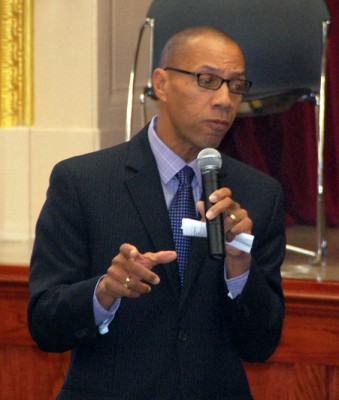
Cathie Black meets with then-Chancellor Joel Klein and deputy chancellor Santiago Taveras. (Photo by Gotham Schools)
Mayor Michael Bloomberg’s surprise announcement this morning that Cathie Black is resigning as New York City Schools Chancellor reveals some of the challenges inherent in hiring a non-educator to lead a large public-school district and inspire the confidence of teachers, parents and the public.
In another shocker, New York State Education Commissioner David Steiner resigned today, though he said his and Black’s resignations were a “bizarre coincidence.”
Black, who was named as Joel Klein’s successor last November, stepped down from the post today after just over three months on the job – and with a 17-percent approval rating from New Yorkers. Bloomberg, who vigorously defended Black in the backlash following her appointment (calling her “eminently qualified”), urged her to resign, The New York Times reported.
“I take full responsibility for the fact that this has not worked out as either of us had hoped or expected,” Bloomberg said in a press conference today.
He’s not being noble by taking the heat: Bloomberg alone was responsible for appointing Black. In a city with mayoral control of schools, Bloomberg is in charge of hiring and firing school chiefs.
Mayoral control has proven contentious, and last year one of its inherent instabilities – unpredictable turnover – was made clear when superintendents in Chicago and Washington, D.C., departed with their respective mayors.
The Black case, as some will argue, offers up another lesson about the dangers of mayoral control: the person calling the shots – especially if it’s someone not likely running for re-election – doesn’t necessarily have to seek or listen to feedback, whether it’s from people in his or her administration or members of the public.
Many took issue with Black’s appointment before she even stepped into the role; parents, teachers and politicians began protesting the choice as soon as it was announced. Before she ever formally took office, the odds were stacked against Black. Mike Petrilli of the Fordham Institute went so far as to predict that she’d be gone by Easter 2011. How prescient Petrilli was.
This points to another important lesson that educators and reformers across the country are learning: public buy-in and communication are important.
In a December 2010 op-ed in Newsweek, former D.C. Schools Chancellor Michelle Rhee said she had no regrets about moving quickly with her reforms. “Still, I could have done a better job of communicating,” she wrote, noting that in particular she should have been clearer to “good” teachers and parents about what she aimed to do and why unpopular decisions were being made.
Black was never able to gain the public’s respect, though, failing at the politics of the job and earning even more criticism with various gaffes and confrontations.
Even if she had been a stellar politician, however, Bloomberg might never have been able to make the public as confident as he professed to be in her appointment. The primary concern from many critics was that, given her background in business and publishing, Black had no education experience to speak of.
Steiner had agonized for weeks last fall over whether to grant Black a waiver since she lacked the requisite qualifications — no advanced degree, no teaching experience and no administrative credential. He’ll have to make another decision about granting a waiver, as Bloomberg has chosen Dennis Walcott as Black’s replacement. Walcott doesn’t have the required three years of teaching experience. Bloomberg is now three for three — Joel Klein, Cathie Black and Dennis Walcott — in appointing chancellors who don’t have the credentials required by New York state law.

Deputy Mayor Dennis Walcott addresses the crowd of students, elected officials and education administrators as Bread & Roses Educational Complex is renamed after businessman and social activist Percy Sutton. (Photo by Elbert Garcia)
Bloomberg – and others – see non-educational experience as a boon, not a hindrance. He argued when first announcing her appointment that she could learn what she needed to about education on the job and that she’d have a staff of experts to help her. The ability to manage, which she already had, was key, Bloomberg said.
School districts all over the country have hired superintendents with non-educational backgrounds based on this logic.
Black’s abrupt resignation may be a sign that this doesn’t play out as well in practice as the theory suggests, though. Education policy is a complex area, one to which many people devote their entire lives, and crash-courses on different topics likely cannot replace years of learning the nuances.
And the team of experts who were supposed to support Black have been departing rapidly, highlighting the problem of relying on others to make up for her shortcomings. John White, who will become superintendent of the Recovery School District in New Orleans this fall, is the fourth of Black’s top deputies to leave since she started in January.
That’s not to say management skills aren’t important. But Black’s inability to manage her way out of her problems suggests that other knowledge and experience may be more important than Bloomberg thought.
The job is also perhaps tougher than Bloomberg realizes. It’s worth recalling one former New York City superintendent’s caution about mayoral control back in 2000, when then-mayor Rudy Giuliani had sought to run the schools. Ramon Cortines, serving at the time as interim superintendent in Los Angeles, famously said: “Mayors will find out that they cannot dictate policy from City Hall. You can have Jesus Christ as mayor and he could not run the school system. You have to have teachers, parents, administrators. Any mayor will learn that.”



